Riley Adams's Blog, page 209
March 30, 2011
Choosing Your Own Adventure—Plotting Solutions When You're Stuck
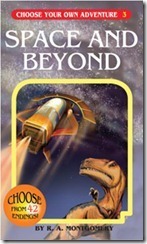 When I was a kid, I loved the "Choose Your Own Adventure" books.
When I was a kid, I loved the "Choose Your Own Adventure" books.
Do you remember those books? Basically, each book would tell a riveting story—you're in a time machine, you're back in the days of dinosaurs, you're blasting off into space—and at the bottom of (most) pages, you got to choose how you were going to handle the situation you were in. "If you run from the T-Rex, turn to page 88. If you hide from the T-Rex, turn to page 40."
Maybe it's my experience with those books that makes me so open when I'm revising with my editor. For the last of the Memphis books, my editor asked me if I could tie a particular character back into the end of the book.
I emailed her back. "Sure," I said. "Here are three alternate endings. Which one do you like best?" Yes, it was "Choose Your Own Adventure" for adults. :)
Being open to different plot paths for your story can be great when editing. But it's also good for moving your story forward when you get stuck.
In my experience, it's good to think big when you're not really sure where your next scene is going. Instead of thinking up one alternate path for your storyline, try thinking up five storylines.
Or try thinking up 10 possible plot directions. Try thinking up 15. They can be random and ridiculous and don't have to be the ones that you're going to end up choosing. But it's a great way to get your imagination going, brainstorming solutions to move the story forward.
Kill a character.
Introduce a new character.
The character quits his job.
The character's mother moves in with him and murders his roommate.
There is a hurricane.
The character's spouse becomes seriously ill and can no longer work.
The character falls in and out of love.
The character has a DUI.
You get the idea. You're just trying to get your creative juices flowing. The funny thing is that in with the wacky ideas, there are usually at least one or two things that could work. There are usually more that could work with some plot tweaking.
Sometimes it's easy to get tunnel vision when it comes to our plots. Even if we know the direction we're heading in isn't working, it can be difficult to see other directions to take. Brainstorming a list is just one way to approach the problem.
The "Choose Your Own Adventure" book in the picture above has 42 possible endings. How many can you come up with for your book? What other exercises do you use when you get stuck?
******
Interested in a monthly newsletter with the top writing articles, blogger spotlights, and interviews with industry insiders? Sign up for the free WKB newsletter here: http://hiveword.com/wkb/newsletter . (You can unsubscribe at any time, and your email information is never shared.)
March 29, 2011
Standing Up for Libraries
 This is a little bit of a departure from what I usually blog about, but I think it's a subject that's important to most writers.
This is a little bit of a departure from what I usually blog about, but I think it's a subject that's important to most writers.
I was out late Tuesday night (past my admittedly-early bedtime) at a town hall meeting in Matthews, North Carolina, arguing against my library branch being closed.
Libraries were listed in with our county's discretionary spending. Somehow, business incentives/development had inched ahead of libraries in the list of priorities.
I don't like meetings. I don't enjoy public speaking—or being filmed while doing it. But I was happy to speak out in the hopes of keeping my library branch open.
I'm going to again run, below, a post I wrote on the usefulness of libraries for writers. They're not only useful for writers—they're essential to the entire community.
14 Reasons Why Libraries are Writers' Best FriendsYou don't have to spend a lot of money to become a better writer. That's a good thing because most writers don't have a ton of money to throw around.
The library has all the resources a writer needs. It's always been one of my favorite places on Earth. Here are the reasons why libraries are writers' best friends:
Research
*Researching your book: Libraries have computers with internet capabilities. They have books and periodicals on a multitude of different subjects. They also have research librarians/information specialists who can help you with research and find reference materials to help you in your search.
*Researching your genre: You can easily check out a dozen recently-published books in your genre. It's a quick way to see what publishers are looking for.
*Need help with grammar and writing style? The library will have reference books to help you. My favorite style book is Elements of Style by Strunk and White. It's been around for ages.
*Books on the writing craft? Different libraries have different books, but there are some that will be in nearly every branch: like On Writing by Stephen King, Bird by Bird by Anne Lamott, and On Writing Well by William Zinsser.
*Some libraries will have subscriptions to helpful periodicals like Writer's Digest.
A Place to Write
*Has your house gotten crazy? Kids/spouse driving you nuts? Is a coffeehouse too expensive? The public library is a great place to write.
Help With the Submission Process
*Looking for an agent? Look at the acknowledgements page in one of the recent releases in your genre. Agents are nearly always thanked.
*Another great way to find agent and editor names is by using Writer's Market and Literary Market Place. Using these books at the library means saving lots of money—these books are expensive.
*Need help quickly summing up your book in a query letter? Look at back cover copy of novels in your genre.
*Don't have email and you need to email some queries? You can set up a Gmail or Hotmail account that can be accessed from a computer at your local library.
Promotion
*Libraries are major book purchasers. Find out which libraries have your book. Go to WorldCat.org, which searches libraries for content worldwide. You just plug in your book's name, hit the search button, and find the results. For a listing of public libraries, go to Public Libraries.com. You'll get physical addresses, phone numbers, and websites (from which you can get the library's email address).Send the acquisitions librarian an email or postcard with your cover photo, ISBN number, title of the book, publisher's name, your name, release date, short summary, and any good review snippets.
*The librarians at my local branch are my friends, too. They've been incredibly supportive—my book is nearly always checked out of the library or on request because of their generous recommendations of my book to patrons. They've also put my book on a display with other regional authors.
*If you're looking for a place to give a writing workshop or talk, your library usually has a meeting room that's perfect for your event. Many of them will allow you to sell your book as well (it's nice to give a donation to their Friends of the Library program if your signing is for-profit.)
*Libraries also provide locations for writing groups and book clubs to gather. For some writers, meeting with other writers and readers is a great way to network and find support and encouragement.
There are many expensive paths a writer can take toward professional development. But it doesn't have to be that way. Writing shouldn't have to cost more than the pen and paper you're writing on.
*****************
Have you checked the pulse of your local library? Could it potentially be facing a budget cut or closure? Please consider a donation of time or money to your branch, if it's struggling, or speaking out in a public forum to state the importance of the library to you and your community.
March 28, 2011
Visuals of Our Characters
 Yesterday it was time for me to go to the Department of Motor Vehicles to renew my driver's license (fun-fun!)
Yesterday it was time for me to go to the Department of Motor Vehicles to renew my driver's license (fun-fun!)
For anyone not living in the States, just imagine your most-un-favorite bland, government-related building. Someplace sort of like the one in the picture above.
With lines like this: 
That would be what a Department of Motor Vehicle office in the US is like.
It was pouring a cold rain yesterday. The DMV office had moved in the last couple of months, and they'd accidentally (I think) provided me with the wrong directions. I took a left instead of a right and ended up in a very bizarre location. Since I figured the DMV would be at a bizarre location, I spent some time looking for it.
I finally figured out they'd given me wrong directions and found the office (you had to make a U-turn to even get in there.) Very tricky!
Sometimes you get warm, funny, helpful people at the DMV—I've seen them there in years past. Most unfortunately, however, those particular people were not staffing this particular DMV. My umbrella broke on the way in and I was sopping. Most of the people in the waiting room were sopping wet, too. The wait escalated. I pulled out my Kindle. No one in the room looked very amused.
Suddenly, there was a primal howling that broke up the nearly complete silence in the soulless, bureaucratic room. It was a blowsy woman who was pitching a hissy fit. "The computers is down (sic)!!!" she stormed up to inform our waiting room, face red, arms waving. She looked a little like she should have been on the cast of a Southern version of Les Misérables.
Apparently she was trying to summon an insurrection of some kind. It was cold and wet, we were in a dreary place, the wait was long, the staff was surly—and the computers were down, meaning that our unpleasant experience was all for nothing. It wasn't a terrible idea.
However, considering the fact that there were armed highway patrolmen right there in the building, no one seemed inclined to take her up on it.
But this was when things got interesting at the DMV for me. Because she was one of my characters. Just a secondary one, but she fit the character to a T. Especially when she was all riled up like that. If I'd dared, I'd have taken her picture with my cell phone. But—I didn't. Otherwise, there might have to be a new mystery written—Murder at the DMV. With me as the victim. :)
The nice thing was, though, is that now I had a picture of her in my head and I could describe her more easily. Seeing someone or something makes it a ton easier for me to describe. It made the whole trip to the DMV worth it. Oh…and the computers finally came back up. I decided to sit there and wait it out. So now I'm good until 2019 (except when I take my son there for his license in the next couple of years.)
Of course, I don't always come across my characters in such a serendipitous way. Sometimes I go actively looking for them.
Places, besides the DMV, where I've found characters:
Swanky characters—upscale coffee shops in nice areas
Suspicious types—the evening news (local, not national)
Unusual characters—amusement parks, circuses, and fairs (I take my kids and a notebook)
Another useful tool for finding images of your characters is Google Images (I like to put the safe search option on to keep from stumbling into areas of the internet where I'd rather not venture.)
With Google Images, you can search for a specific type of image (cowboys, ballerinas, football players) or just sort of wander around until specific images catch your eye.
Do you need images of your characters to better describe them? How do you find them?
March 27, 2011
Tips for Restless Writers
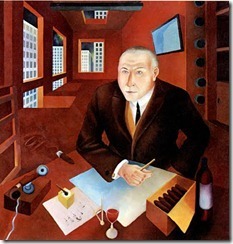 Are we getting wired differently because of modern distractions? I'm not sure, but I know that it's hard for me to sit still for very long. I just get very restless.
Are we getting wired differently because of modern distractions? I'm not sure, but I know that it's hard for me to sit still for very long. I just get very restless.
There are plenty of writers out there that have amazing discipline and can sit for hours at their computer each day, knocking out their word goals. I'm not one of them. I always make my goals, but I've had to meet them on my terms. In case you're a restless writer too, this post is for you. :)
Here are some tips for handling restless writer syndrome:
Make a list of all the other non-writing-related things that need to be done before starting a writing session. For me, the more exhaustive this list is, the more emptied-out my head is and the better I can focus on my writing. On this list, I'll include everything from household chores, to my children's activities, to emails I need to send, groceries I need to buy, phone calls I should make, etc. The list includes whatever I can think of that might pop up and distract me while I'm writing.
I came across a post last week on the WorkAwesome blog: The Path to Productivity: Short Hours, More Breaks. The post quoted a recent study that found:
Rather than diminishing productivity, short breaks allow people to maintain their focus on a task without the loss of quality that normally occurs over time.
So taking short breaks sounds like a good way of approaching tasks (at least for some of us). But the article warns against checking Facebook, etc., during your break. They recommend choosing an activity that's something you can easily break away from (and maybe setting yourself a timer as a reminder that your break is over.)
Do other writing-related tasks if you're in a time crunch or under deadline. I'll switch from the manuscript I'm writing to one that I'm editing. Or I'll switch to a brainstorming activity for a new project. That way I'm still being creative, still getting all the writing done that I need to do—but I'm shaking it up a little. It's good to also have a short to-do list of writing related tasks. Right now, mine has on it: edit chapter on next Myrtle Clover, brainstorm 5 minutes for outline, and add character descriptions to quilting WIP.
Open up to the possibilities of writing on the go during the day. If I told myself that my writing was only going to happen at a specific time of the day, on my laptop, then I wouldn't get nearly as much done. I remind myself at the beginning of the day that I'm collecting sights, sounds, words, and characters for my story. It helps me be more observant.
Move around. Some of my better ideas happen when I'm moving around. I write in my head as I clean the house, run errands, garden, and walk. If I'm feeling particularly restless, I'll try an activity that doesn't require a lot of thought (weeding, vacuuming, cooking familiar recipe) and I'll write my book in my head as I do it.
Reduce up front the amount of time you're writing before taking your breaks. Consider writing in 15 minute segments. Will you lose your train of thought this way? In my experience, no. If I worry I will, I just jot down in the margin in Track Changes where I want the next scene to go. Then I run off and put the laundry in the dryer, start the dishwasher, and come back to the manuscript.
Are you a restless writer too? How do you stay productive?
March 26, 2011
Twitterific
Here are writing links that I've posted to Twitter in the last week.
I'm delighted that now we have an efficient method of locating resources on writing topics when you need them—via the Writer's Knowledge Base search engine and software engineer and writer Mike Fleming's ingenuity. The links I tweet (which are writers' blogs, agents' and editors' blogs) all are added to the engine to make it easier for you to access the information you're looking for.
Interested in a monthly newsletter with the top writing articles, blogger spotlights, and interviews with industry insiders? Sign up for the free WKB newsletter here: http://hiveword.com/wkb/newsletter . (You can unsubscribe at any time, and your email information is never shared.)
Last month's WKB newsletter featuring an interview with @p2p_editor editor Jason Black: http://bit.ly/g5MRDe
How one author was able to get objective about her work and get published: http://bit.ly/gjJdrF
10 tips for an effective blog sidebar: http://bit.ly/g12KvQ
Expanded Story Elements Checklist: http://bit.ly/hfH9hH
The Future of Self-Publishing Services: http://bit.ly/f4nOfs
The Path to Productivity: Short Hours, More Breaks: http://bit.ly/h4PjjM
The magic of the 1st draft: http://bit.ly/hhvvh2 @storiestorm
Why Pen Names Suck & Can Make Us Crazy: http://bit.ly/gxxG8M
When Good Characters Do Thoughtless Things: http://bit.ly/hDbAOQ
5 Tips for Being Found by Your Readers: http://bit.ly/eHQErf
10 Reasons Someone Else's Novel Shouldn't Have Been Published: http://bit.ly/h0YvB1
Writing past our weaknesses and why we should do it: http://bit.ly/gS1laf
Go-to writing books: http://bit.ly/dZAvRV
Changing the world one word at a time: http://bit.ly/fTRk4P
Myst. Lov. Kitchen: Frugal and Healthy II: Black Bean Chilaquiles http://bit.ly/fv4JKw @CleoCoyle
Self-Publishing Bang for the Buck: http://bit.ly/gMA06O
The End of the Affair--Your Novel Doesn't Love You Anymore: http://bit.ly/hgHh4f
An exercise for writing vivid characters: http://bit.ly/gCi3dX
5 Ways To Threaten Your Protagonist: http://bit.ly/i1JLIX @ajackwriting
Tips for slicing and dicing your manuscript: http://bit.ly/dLR80m @juliemusil
Creativity Tweets of the Week — 3/25/11: http://bit.ly/erxcEw
5 Principles for Generating Ideas: http://bit.ly/hoM0FD
Style Sheets: An Editorial Tool: http://bit.ly/hSJTvn
Writing Theory -- The Monomyth Part 6: http://bit.ly/eoIuA7
6 Core Analogies for the 6 Core Competencies: http://bit.ly/iaFUJr
Best Articles This Week for Writers 3/25/11: http://bit.ly/eNHK82
How to Write a Press Release—A Mini-Tutorial: http://bit.ly/fHy2Pe
Should authors revise for agents without an offer of representation? http://bit.ly/g5vPse
It's never too late--2011 Writing Progress Spreadsheet: http://bit.ly/g2yZDa @storiestorm
How Writers Can Use Amazon to Sell Books: http://bit.ly/gTyLnN
The discovery of the victim in crime fiction (cases where the body isn't reported): http://bit.ly/esgH2x @mkinberg
Creating non-violent conflict in your story: http://bit.ly/h9kdoY
What to do when the words won't flow: http://bit.ly/f2j6hY
Proper Dialog Placement: http://bit.ly/f9L0dw
Editorial | It's Not About HarperCollins (Library Journal): http://bit.ly/gW3vlg
Identifying Your Themes: http://bit.ly/eHDiwB
Place in the Novel: Setting or Character: http://bit.ly/fNGWfv
You're so nauseously nice: Getting Insulted by Authors (LA Times): http://lat.ms/h3nbU0
Let Your Senses Do The Walking And Talking: http://bit.ly/i1ZQq5
Myst. Lov. Kitchen: Eat Healthy and frugally! Chicken Tortilla Roll-Ups http://bit.ly/hl03a2 @CleoCoyle
Good and Bad in Google Book Search Settlement Decision: http://bit.ly/fAY02k
What Writing Teaches Us About Parenting: http://huff.to/fK6ZNO
Noted Self-Publisher (Amanda Hocking) May Be Close to a Book Deal (NY Times): http://nyti.ms/fpwF7P
5 Ways to Shorten Your Twitter Bio: http://bit.ly/iigqDd
The Anatomy of a Successful Ebook Giveaway: http://bit.ly/dMH4Fu
Dealing with Agents and Publishers: http://bit.ly/edVnau
10 Reasons Why Authors Love Ebooks: http://bit.ly/gs8i1x @thecreativepenn
Tips for Tackling the Final Proof: http://bit.ly/gE8dm1
Written in stone? Editing your backlist books for reissue as ebooks: http://bit.ly/gN1mlS
The most popular links on synopsis writing that I've tweeted: http://bit.ly/eWeJtB
Creating and Writing Compelling Villains: http://bit.ly/eBzNu3
Different paths to the same goal: http://bit.ly/hZTLUG
Why (Most) Publishers Are Still In New York: http://bit.ly/fLhI6t
8 Fiddly Things You Can Do To Your Manuscript To Make Your Editor's Day: http://bit.ly/ezveXy
109 Ways to Make Your Business/Book Irresistible to the Media: http://bit.ly/fWc8Ec
TV Shows: A Writer's Teaching Tool: http://bit.ly/i8qPGk @storiestorm
Good Grief: The Painful yet Productive Process of Revising after a Critique: http://bit.ly/h0N4VN
Go Hard or Go Home–Blogging & Branding: http://bit.ly/ggHY7j
Barnes & Noble Struggles To Find a Buyer: http://bit.ly/fAb0fn
Authors Find Marketing and Publicity Strength in Numbers: http://bit.ly/dSM2mh
10 Steps to Making Your Author Blog a Rockin' Success: http://bit.ly/f7Ic7g @victoriamixon
Titles. Or Not. http://bit.ly/eq3MZf
The Simple 5-Step Formula for Effective Online Content: http://bit.ly/fxjj2S
Embracing inconsistency as a writer: http://bit.ly/gjTWDV
Battling the Romance Novel Stigma: http://bit.ly/eLtlLd
Myst. Lov. Kitchen: Fruit au gratin - delish! http://bit.ly/gNifIi @CleoCoyle
Characters and emotional baggage - your characters' motivations: http://bit.ly/eF61e2
Some writing humor from @inkyelbows: http://bit.ly/ezsXy8 and http://bit.ly/gPTTmP
A 21st c Writer's Helper: The Virtual Assistant: http://bit.ly/gcClPy
What's your story's agenda? http://bit.ly/hBSHfD
How to know if you're ready for critique--3 questions: http://bit.ly/hZ82FC
Strategies for juggling multiple Twitter accounts: http://bit.ly/gyMkLG
Self-editing checklist--scene analysis: http://bit.ly/fCwBjx
How to Balance Blogging and Your Day Job (while still growing your blog): http://bit.ly/hd0CZo
Secret Recipe for a Novel: http://bit.ly/fJrvr5 @4kidlit
Making Dialogue Dynamic: http://bit.ly/fzA9Fp
Deep-Tissue Critique: 4 Ways to Make It Hurt So Good: http://bit.ly/dYmUVq @mesummerbooks
2 debut novelists talk about the necessity of thick skin: http://bit.ly/dOUCgA @4kidlit
Backstory Problems & How to Overcome Them: http://bit.ly/iafAjI
Finally finished your book? Now it's time to get writing...again! http://bit.ly/h3Iim5 @hartjohnson
How to build an Amazon author page: http://bit.ly/dSx2FM
Don't be a Fail Whale--the Cutesy Moniker Tweeter: http://bit.ly/elgXIY
The importance of muscular verbs: http://bit.ly/e624WV & lists of strong action verbs: http://bit.ly/fVgobx & http://bit.ly/fjyNb7
Writing Can Be Learned—But It Can't Be Taught: http://bit.ly/fy8wKT
The Real Story Behind Pacing: http://bit.ly/i2Upow @joanswan
Punctuation in dialogue: http://bit.ly/gByXKe
How to fight spring fever and get some writing done: http://bit.ly/fkZRQW
10 Reasons Why You Should Be Blogging: http://huff.to/dNVf46
Writers should focus on the positive: http://bit.ly/gC88mg @thecreativepenn
7 things one author has learned so far: http://bit.ly/gwuDbS
The Return of the Live Event for Book Promotion: http://bit.ly/gVKbpf
4 Organizational Tools for Writing: http://bit.ly/ec2MjZ
Why Blogging Might Be Killing You, And How to Fight Back: http://bit.ly/hE1roi
58 Habits That Will Help You Succeed: http://bit.ly/gRKHdU
Myst. Lov. Kitchen: Chicken Crescent Rolls http://bit.ly/gzffKE @CleoCoyle
Brewing up Inspiration: http://bit.ly/g6yqt2
Repurpose: Get More Mileage from Your Blog Posts: http://bit.ly/elgocF
Twitter Quitter: http://bit.ly/hSTCKC
Creating the main character for a fantasy series: http://bit.ly/h9Nfx8
Mystery Writer's Guide To Forensic Science - Collecting Evidence VI: http://bit.ly/fuQBra
How The World of Star Trek Taught One Author How to Write: http://bit.ly/hZAnEm
Living Your Myth: Mishima And Dying For Your Convictions: http://bit.ly/fn2AxZ @agent139
Polishing vs. Fixing: http://bit.ly/evau97
10 ways to reach "the end": http://bit.ly/i8zt3g @elspethwrites
5 Pickles to Write Yourself Into: http://bit.ly/hqhbFO
Top 10 reasons freelancers need to take a vacation: http://bit.ly/ePvRq5
9 tips for conferences: http://bit.ly/gDBnfj @authorterryo
Can Editing Be Fun? Maybe. http://bit.ly/gFbZYO
Avoiding passive prose: http://bit.ly/hsAdBo
Bestselling Author Turns Down $500K Deal to Self-Publish: http://bit.ly/ibo7D6
7 Uneasy Coercion Tactics That Will Force You to Write: http://bit.ly/ft57tX
The Care And Feeding Of Your Favorite Authors: http://bit.ly/eMzHgX
Combating Writer's Envy: http://bit.ly/eyDUmo
How to Make Your Free eBook a Magnet for New Readers: 5 Crucial Tips: http://bit.ly/fTZxrd
Description: scents and seasons: http://bit.ly/eMchpW
Writing Tools: Scrivener: http://bit.ly/eHsP5H
Back to Basics, part III: Maintaining Self-Confidence: http://bit.ly/hqiXHL
The Solace of Dark Novels and Memoirs: http://huff.to/eUeYMw
One Art, Please. I Have 99 cents: http://bit.ly/fbtZZl
How to speak publisher - B is for bind-up : http://bit.ly/gkyaTN
Young Adult Books and Their Readers: http://bit.ly/fakJVx
A Side Order of Stupid: http://bit.ly/exAXug
Formatting Your Documents for the Kindle in 8 Steps: http://bit.ly/eEXwD1
Myst. Lov. Kitchen: A Writer's Snack: Crust-Free Pizza from Cleo Coyle http://bit.ly/f10StK @CleoCoyle
Writing exercise--write a letter: http://bit.ly/gdBN0Y
Should you argue with your publisher over your cover? http://bit.ly/feCp8v
5 ways to be a crap literary agent: http://bit.ly/gBHSw8 @jammer0501
Where to find your interestingness as a writer + blogger + ruler of your domain: http://bit.ly/dIzHX4
A Character-driven Approach to Kissing Scenes and Sex Scenes: http://bit.ly/ffd9Bt
The best way to get a literary agent's attention on Twitter: http://bit.ly/fQJHyw
To Conference or Not To Conference? http://bit.ly/ggDWzZ @authorterryo
Forget the Writing Rules: http://bit.ly/fyhqvj
Hardworking vs. talented: http://bit.ly/f4xWoO
Authors, be careful not to overpay for POD services: http://bit.ly/ibwT9u
Best Tweets for Writers (week ending 3/18/11): http://bit.ly/hBVbfM
When Your Agent Isn't Feeling the Love: http://bit.ly/gsETo3
Strategic tweeting for authors: http://bit.ly/h0IXXX
Bios: Stumbling on self-intros: http://bit.ly/ghVvC3
Best and Worst Agent & Editor Advice: Part 2: http://bit.ly/i4KYLc
Using Text to "Enhance" E-books and Other Insights from the 2011 Leipzig Book Fair: http://bit.ly/f4PzuG
When Your Can't Write What You Love to Read: http://bit.ly/f78cl3
Why Vague Writing Is Weak Writing: http://bit.ly/eJ1u5W
Fiction within fiction – made-up worlds and stories inside stories: http://bit.ly/fjJgB2
The Five Stages of Editing: http://bit.ly/eTgYbu
What to do when you get an agent call: http://bit.ly/dQVkoJ
Plotting Through Goals: http://bit.ly/gn4OlK
Style sheets: http://bit.ly/gfvu7T
A synopsis checklist: http://bit.ly/hroF7w
Myst. Lov. Kitchen: Gone to the Dogs -- Crock Pot Barbecue http://bit.ly/fwpAkS @CleoCoyle
How to format a query letter: http://bit.ly/hkXDoK
Tell, Don't Show: http://bit.ly/fzpmNS
An agency with a publishing dictionary: http://bit.ly/dDXIZh
Dos and Don'ts of Combining Genres: http://bit.ly/flwgvE
Where the editors are in 2011: http://bit.ly/hrVjST
Revising by color: http://bit.ly/ekuFgE
Want the most popular writing articles of the month? Sign up for the monthly WKB newsletter for links & interviews: http://bit.ly/gx7hg1
4 Ways To Make Yourself Complete a Book: http://bit.ly/e2uVb7
An author shares platform-building insights: http://bit.ly/hlx1HB
"I Did Everything Wrong...and Still Got a Contract": http://bit.ly/ikBbIA
Regaining Perspective on Your WIP: http://bit.ly/gPAKQ9
Equip Your Characters: http://bit.ly/fhZyfz
Cues from the Coach: Taming Your Characters: http://bit.ly/fBocan
The Looks of Writers, Or How To At Least Look Like A Writer: http://bit.ly/fgJ1J7
Multiple POVs--how many is too many? http://bit.ly/eO3U2K
On Languages, Linguistics, the Future, and the Fantasy: http://bit.ly/fP7Sfc
What makes a book great? http://bit.ly/fYLhgy
Are You a Wimpy Blogger? http://bit.ly/ib8895
Myst. Lov. Kitchen: Welcome, Guest Author Ellery Adams http://bit.ly/h5oy5m @CleoCoyle
A Novel is Not a Story: http://bit.ly/hgK67Z
When an Author Meets His Critics: http://huff.to/hDrAQq
WordPress Plugins To Rock Your World: http://bit.ly/dGoefJ
The Charlie Sheen Guide to Winning! at Online Marketing: http://bit.ly/geoSUM
A Writer Blogs About Process: http://bit.ly/fVDt07
Six Limitations of the First Person POV: http://bit.ly/fkW7wg
What's popular on the WKB search engine today? http://bit.ly/g9fTqf
9 Mindfulness Rituals to Make Your Day Better (a little zen for writers): http://bit.ly/hu1rxA
Self-Editing: Character Development: http://bit.ly/gGBjgG
Writing is about growing up: http://bit.ly/dPWRaB
Developing Voices for Different POVs: http://bit.ly/hcFb8J
8 iPhone Apps to Grow & Connect With Audience: http://bit.ly/fOJzaW
How To Tell If Your Writing Is Any Good - Part 1: http://bit.ly/gKc5D0
6 Ways to Promote Your Book for Free: http://bit.ly/gmQCzl
Social Media: There's No Such Thing as Too Early: http://bit.ly/htxEMp
A Writer's Antidotes for Envy: http://bit.ly/f0byLS
Top 12 iPhone Apps That'll Increase Your Productivity: http://bit.ly/eVRtCg
The Preposition Gnome: http://bit.ly/i4HJ6p
The art of hitting send: http://bit.ly/esCVjS
Connections between some well-known crime writers' lives and their stories: http://bit.ly/e1qFJ7 @mkinberg
Myst. Lov. Kitchen: Is it time for a party? http://bit.ly/fssh8L @CleoCoyle
Resources for Christian Fiction Writers: http://bit.ly/dSMZd6
How Captain Kirk Led An Author to Write Historical Fiction: http://bit.ly/eAmrTN
Immersed in our stories: http://bit.ly/gzdUqw
Desperate writers: http://bit.ly/i4dhFJ
March 25, 2011
When Good Characters Do Thoughtless Things
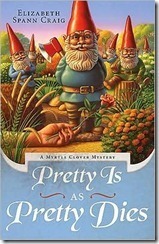 I always enjoy hearing from my readers. In fact, my readers' comments can really influence my writing.
I always enjoy hearing from my readers. In fact, my readers' comments can really influence my writing.
I've heard from a couple of readers since Pretty is as Pretty Dies was released in 2009 that they disagreed with a character's actions in one scene. I'll try to be a little vague here, since I don't want to write in any spoilers.
My protagonist, octogenarian Myrtle Clover, was attacked and was rescued by a new neighbor who was, basically, a stranger to her because he'd recently moved in.
Myrtle and her police officer son, Red, have a little bit of a prickly relationship. They love each other, but they get on each others' nerves. Badly. Myrtle is irritated by her son's meddling. She insists on her independence and some respect. Red is irritated that Myrtle puts herself in bad situations and interferes in things he'd rather see her leave alone.
The new neighbor, after rescuing Myrtle, calls her son. It's very late at night and Red is awakened by the call. He comes over, hears her story, fusses over her. They nettle each other a little. Myrtle stubbornly decides to stay with her neighbor who has fixed them coffees. Red goes back home and goes back to bed.
He shouldn't have left her, say these readers.
It wasn't a case of character motivation—if it was, then I'd definitely be paying attention. These two have something of a contentious relationship. The main reason for the tension is Myrtle's desire to be taken seriously. She wants respect and independence. She wouldn't have appreciated being carted back to her home by Red unless she wanted to go there.
But the readers disagreed with Red's actions. They thought he was being thoughtless. That he wasn't being a good son by not protecting her…regardless of whether she wanted that protection or not.
Both times the readers asked me about this, it was in person. Which is unfortunate because both times my automatic response was, "Oh, I totally understand what you're saying. But that was the character's choice. That's what he chose to do. He was being thoughtless."
Acting like our characters are alive is probably one of those things that gives writers a reputation for being a little crazy.
But I knew that this was a thoughtless, inattentive thing that this particular character would do in that circumstance.
I've thought about this a little lately, mainly because I'm about to address a book club in South Carolina in a couple of weeks for this book, and want to be prepared with something a little better to say than, "But that's what the character did."
I still really believe this nice guy would be thoughtless in this circumstance. Here it is, the middle of the night and he's been pulled out of bed. He's irritated, scared for his mother's safety, and she's still harping at him about how she's completely fine and he needs to stop his fussing. I think I laid the groundwork in the early part of the book for him to behave that way. It doesn't seem to be to be out of character, but it seems like something he'd do when tired, grouchy, and generally out of sorts.
When he was having a bad day.
What I think I would do if I wrote the book over again, is that even though I set up the motivation and the groundwork, I needed to have some sort of repercussion for that behavior.
My readers were outraged for Myrtle. I'm glad they liked her enough to want to protect her. They were quite fierce, both times, when they brought it up. I appreciated it.
I listen carefully to my editors' ideas. I listen really carefully to my readers'.
I think there's sometimes an urge when we're reading books, or maybe in life too, to see someone pay for a mistake. Even just a mild one. Or at least to get told off for it.
If I had to write it again, I'd have Red's wife take him down a notch, when he got back home: "You did what? Left her over with some new neighbor she's never met? After she's been attacked? What?"
Because vengeance can be sweet.
So, summing up, I think the better approach for having a nice guy (not, in this case, the protagonist, but an important character) behave thoughtlessly is to not only lay the groundwork for this type of behavior, but to have some sort of repercussion for this behavior or some sort of dressing down for it later.
Have you ever had a good guy do something thoughtless or imprudent? How did you approach it?
March 24, 2011
Beta Readers
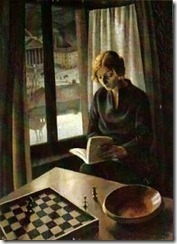 I think I've mentioned before that my writing is a fairly solo process up until my deadline.
I think I've mentioned before that my writing is a fairly solo process up until my deadline.
I really do look at my books as collaborative efforts between me, my agent, and the editorial staffs at my publishers. I'm open to suggestions, I'm happy to make changes or substitutions. Want to send the plot off in another direction? I'm game. Want me to write in a character or kill one off? I'm your writer. If you have an idea, I can write it and we can see what happens. Try me!
But I don't really have the beta readers in on the drafting process. I should. It would definitely help me out.
The reason I don't, I think, is because I'm frequently working on more than one project at once and my drafts are disasters. Right now I'm editing two different manuscripts and writing a requested synopsis for the second book of the new series. I'm under several deadlines.
I know what's going on in my draft. I make cryptic notes to myself with Track Changes in the margins. I know that there are huge sections that are out of place. I know that there are unintentional cliffhangers that lead off into nothingness. It all makes sense…to me. And I know in my head exactly how I'm going to fix it.
It wouldn't make sense to anyone else though. My cryptic notes in the margins don't even make sense unless you can get inside my head. And that's why I'm really reluctant to share it out.
My next deadline is June 1. When I was in Anderson, SC, last weekend, I gave my mother the manuscript. She needs to edit on paper, so I carefully printed it out for her.
This time I actually thought ahead and tried to be considerate. Ordinarily, there are no page numbers on the document, and no chapter breaks. :) And this time, the manuscript was even sort of in order.
But… "Mama?" I said. "The only thing is that the ending won't make sense."
"Oh, it's one of those endings where you have to think about it and figure it out?" she asked.
"No, I mean it's really just an incomplete ending. Like—not finished. But no worries! It's all under control!"
You can only do something like this to your mother. Here's a book. Please read it very carefully from start to finish, the sooner the better. But you'll have to make up your own ending because it's not included.
If I gave that mess to my agent, I can only imagine what she'd say. She's a little more worried about endings that don't make sense or endings that are completely AWOL. Since our livelihoods are somewhat tied together, I can understand why she'd be concerned.
I've had some great offers from beta readers and I really do mean to take advantage of them…when my manuscripts are a little more orderly. The only problem is that by the time they're orderly, I'm right up on the deadline. And it's not very nice to ask someone to critique a book in three days time. :)
So…I'm dumping it all on my poor mother. Because mothers take on stuff like that! She's a special kind of first reader.
So this is my question for you—if you use a beta/first reader, what kind of condition is your manuscript in when you hand it over? Do you have different kinds of beta readers—some who you could dump a messy manuscript on, some who get a more finished product? If you don't have a beta reader, why not? Is it just a matter of not finding one, not having time to return critiques, or another reason altogether?
March 23, 2011
Different Paths to the Same Goal
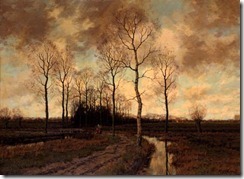 My daughter missed a week of school last week because she had a mysterious fever virus that wouldn't go away.
My daughter missed a week of school last week because she had a mysterious fever virus that wouldn't go away.
Most unfortunately, her 4th grade class learned how to simplify, compare, and order fractions during that time. Sans her.
Even more unfortunately, there is a new way to do this math.
Not that I was even great at doing it the old way.
On Monday, when she came home with her fractions homework, I attempted to show her how to simplify fractions…the only way I knew how.
It wasn't the way the teacher wanted the class to simplify fractions. She was supposed to do something to do with fact families maybe? And finding multipliers? Something like that? Or factors? Something?
At any rate, it boiled down to the fact that I was approaching the task in a completely different way from her teacher. This made her feel both frustrated (with the assignment, her teacher, and me) and worried about solving the problems.
I could get the right answer (amazingly) when I simplified 24/108. But she needed to arrive at the answer differently.
When writing a book, you can choose to outline…or not. You can edit as you go…or not. You can research at the beginning of your project, at the end, or not at all. You can favor writing plot-focused books or character-focused ones.
The different approaches don't stop there. Let's say that you finally chose the methods that worked for you and now you've got a finished manuscript. Do you query it? Do you consider self-publishing it? Do you put it out as an e-book?
It's enough to make your head spin.
I read an article a couple of days ago on Jane Friedman's Writer's Digest blog , There Are No Rules, about NYT Bestselling author Barry Eisler's decision to turn down a $500k deal from St. Martin's to self-publish his book.
Now that's a different approach. But it's the kind of thing I'm hearing more and more about.
Sometimes I'm tempted to feel like my daughter with the different approaches for simplifying fractions—bewildered and frustrated and uncertain of the right way to continue.
But then I remind myself that our books all end up at the same place—in the hands of our readers. What's important, ultimately, isn't how we got there but the quality of the books that we're giving them.
What matters is the end-product: whether it's a correct math problem or a page-turning novel.
Do you find the different choices and approaches in writing and publishing confusing? How do you find the right path?
March 22, 2011
How to Fight Spring Fever and Get Some Writing Done
Today I'm over at "A Good Blog is Hard to Find," blogging on some ways to keep motivated when you'd rather be looking out the window.
Hope you'll join me (and that you're having some nice weather where you are.)
March 21, 2011
Improvisation in Life and Writing
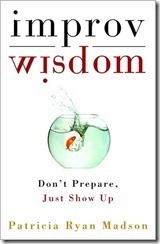 Last weekend I was heading to Anderson, SC, to visit my parents and have a radio interview with a local radio personality there. He'd told me just to contact him whenever I planned a trip to see my folks and he'd tape an interview.
Last weekend I was heading to Anderson, SC, to visit my parents and have a radio interview with a local radio personality there. He'd told me just to contact him whenever I planned a trip to see my folks and he'd tape an interview.
My daughter was sick all last week with a fever, so I emailed him at the last minute, "Sorry for the last-minute email, but I'm going to be in Anderson this weekend. Would you like to schedule an interview?"
He emailed me back, and asked me to call him at a particular number—different from the one I had on file for him.
"Could you come to the hospital for our interview?" he asked. "I've been here for a week now and I don't have next week's show booked—actually, your visit is working out perfectly."
"Can you even do an interview at the hospital?" I asked. I was feeling a little uncertain about the whole thing.
"Sure I can. I've already done one this week for the show that's running tomorrow. If you don't mind, it would work out great for me."
So we did. The interview went great—we just passed the microphone back and forth between each other. I've never actually done a face to face radio interview before and I was pleased at how well it went. Usually when I do a radio interview, I'm on the phone and not even in the same state as the interviewer.
In some ways, the in-person radio interview was easier than the phone interviews I've usually done. On the phone, I'm always listening hard for any clues that I need to shush up and move on to the next subject. When you're face to face with your radio interviewer, you get visual clues to wrap up a particular train of thought. (Hurry up motions).
At one point in the interview, I was asked about how I'd ended up writing for both Midnight Ink and Penguin Berkley. I started talking about slush piles and the interviewer held up his hands and mouthed, "Tell them what a slush pile is!" That's something that wouldn't have happened in a phone-in radio interview—it wouldn't have occurred to me that I was using jargon. So I quickly interjected an explanation.
The interview wrapped up well and afterward the interviewer told me to let him know when I was back in town for a signing and he'd get some local TV coverage for it. I might have gulped a little, but told him that sounded great.
I'm not really a great spur-of-the-moment, go-with-the-flow type of person. I like to organize and plan and apply my Type A self to the process. I like everything to be very orderly.
But I'm learning to go with the flow. One thing that's helping me is a book I downloaded on my Kindle last week. In fact, it was the book that helped me tell the interviewer we'd go ahead with the interview instead of rescheduling it for another time.
While I was reading blogs last week, I came across a post on Tribal Writer that mentioned the book Improv Wisdom by Stanford professor Patricia Ryan Madson.
The Tribal Writer post mentioned the book as a way to combat procrastination. I don't need help with that, but I do think I need help with being a little more flexible. Madson recommends that we say "yes" more often in life and see what happens.
From the Publishers Weekly review:
If you improvise, she says, you "will make more mistakes" but you'll also "laugh more often, and have some adventures." Here she offers 13 maxims to guide the fledgling improviser. "Say yes" … it will open up new worlds. "Don't prepare": in focusing on the future, you might miss the present. "Start anywhere": take any entry into a problem, and once you get inside you'll have a better perspective.
I think that I've got a very cautious voice inside me that wants to say "no" until I have a chance to absorb what I'm facing. I've noticed that I'm a lot more flexible when it comes to my writing—and it always works out really well. When I let characters propel my story in surprising ways, I'm usually pleased with the results.
And I'm discovering that I'm also making new discoveries whenever I step outside my comfort zone with life, too. That might be stretching myself with promo (book tour, interviews, etc.) but it might be just growing as a writer by saying yes to a variety of new experiences and people.
I liked this approach for a variety of stumbling blocks—whether it's procrastination or uncertainty about how to approach a difficult scene…or being more outgoing with marketing. Saying yes, focusing on the present, and jumping in to tackle our obstacles sounds like a good way to move forward. And we might end up with more opportunities along the way—opportunities to network and find inspiration with people and situations that we come across.
How often do you step outside your comfort zone? Are you more flexible in your life and writing, or a little more cautious?


![Terry3_thumb[1]](https://i.gr-assets.com/images/S/compressed.photo.goodreads.com/hostedimages/1380447585i/1701687.png)



